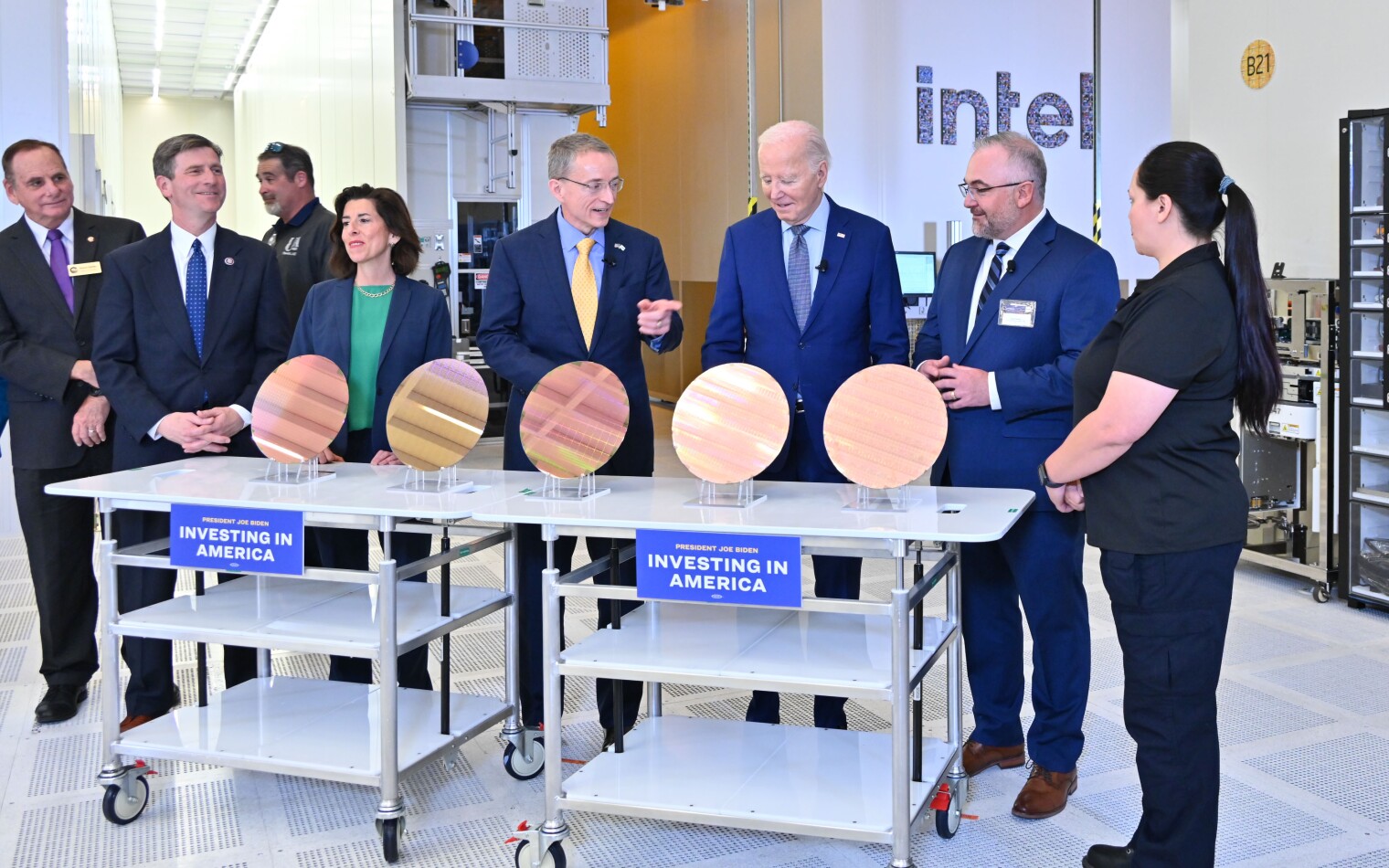| |
| FYI: Science Policy News from AIP |
| THIS WEEK |
|
|
|
|
|
|
| What’s Ahead |
 |
| Aerial image of the Pentagon. (Air Force Staff Sgt. John Wright / DOD) |
Congress Cuts DOD Research and Holds NIH Flat in Final FY24 Appropriation
The Department of Defense’s budget for basic research will drop 10% to $2.6 billion for fiscal year 2024 under the final package of appropriations legislation that Congress passed last week. Although Congress increased DOD’s total budget for Research, Development, Test, and Evaluation programs by 6% to $152 billion, it cut the portion focused on basic research, applied research, and advanced technology development by about 4% overall to $21.5 billion. The legislation also holds the National Institutes of Health’s budget about flat at $48.6 billion. That amount includes funding for the recently created Advanced Research Projects Agency for Health (ARPA–H), which is also remaining flat at $1.5 billion. Congress finalized appropriations for most other science agencies in a separate package of appropriations bills enacted earlier this month. Consult FYI’s Federal Science Budget Tracker for details on these appropriations and the Biden administration’s budget request for fiscal year 2025.
Next-gen Gravitational Wave Detector Concept Study up for Review
As part of its spring meeting this week, the National Science Foundation’s Mathematical and Physical Sciences Advisory Committee will discuss a report recommending configurations for a potential future U.S. gravitational wave detection network that would have about ten times the sensitivity of NSF’s Laser Interferometric Gravitational-Wave Observatory (LIGO) by the mid-2030s. In the charge for the study, NSF noted that LIGO “was initially designed with a life span of about 20 years, although it is being incrementally extended through additional, and ever increasing, investments to refurbish or replace critical elements.” At the meeting the committee will also discuss a recent report recommending changes to the way NSF assesses proposed facility construction projects. NSF is currently weighing an increasing number of requests from across scientific disciplines for new infrastructure projects. NSF’s governing board cited this high demand in its recent announcement suggesting that NSF is unlikely to fund construction of both of two proposed giant telescopes.
CCP Committee Chair Gallagher Leaving Congress on April 19
Rep. Mike Gallagher (R-WI), an active lawmaker on technology policy and chair of the House Select Committee on the Chinese Communist Party, announced last week that he will resign from Congress on April 19. As chair, he established himself as a staunch proponent of efforts to compete with China’s technological ambitions and to enact new research security policies. In December, the committee released a bipartisan report proposing a number of such measures as part of a broader “reset” of the U.S.'s economic relationship with China. Gallagher has also been active on defense technology issues in his role as chair of a technology subcommittee of the House Armed Services Committee, holding a hearing on AI in the military the same day he announced his resignation. Rep. John Moolenaar (R-MI) will replace Gallagher as chair of the CCP Committee.
|
|
| In Case You Missed It |
 |
| From left: Commerce Secretary Gina Raimondo, Intel CEO Pat Gelsinger, and President Joe Biden on a tour of Intel’s Ocotillo campus in Chandler, Arizona, on March 20. (Intel Corporation) |
Intel Set to Receive Huge CHIPS Manufacturing Subsidy
The White House announced last week that the Commerce Department plans to provide up to $8.5 billion to Intel to support the company’s planned projects to expand domestic semiconductor manufacturing. The funds will be split among factory construction and modernization projects in Chandler, Arizona; Rio Rancho, New Mexico; New Albany, Ohio; and Hillsboro, Oregon. The deal also gives Intel access to $11 billion in loans. Speaking at Intel’s Ocotillo Campus in Arizona last week, President Joe Biden emphasized the workforce education components of the funding award and tied it to his administration’s broader push to “on-shore” semiconductor manufacturing. The award is the latest in a series of semiconductor manufacturing awards issued in recent months by the Commerce Department and will be the largest grant provided by the CHIPS for America program. Other recent awards include $1.5 billion to GlobalFoundries in February and $162 million to Microchip Technology in January.
JASON Urges Caution in Adding New Research Security Controls
A new report from JASON, an elite science advisory panel, argues against placing broad controls on areas of fundamental research viewed as sensitive, instead proposing a project-by-project risk mitigation process. The report was commissioned by the National Science Foundation as it prepares to implement new controls on sensitive research in response to provisions in the CHIPS and Science Act. JASON reaffirms a Reagan-era- presidential policy that holds that products of fundamental research should generally be unrestricted unless they are deemed sensitive enough to warrant being classified. However, JASON does conclude that changes in the global environment since then warrant new approaches to research security, noting for instance that cutting-edge military technology increasingly originates in the civilian sector instead of the inverse. It also raises concern that stances taken by the Chinese government are undercutting the premise behind international collaboration, writing, “International collaborations with those who share the ideals of openness and transparency benefit all participants. However, recent efforts of the People’s Republic of China (PRC) to preferentially direct fundamental research toward military needs, and its decision to restrict the flow of information out of the country, may severely limit the benefits of collaborations with research organizations within the PRC.” JASON suggests that instead of trying to designate specific sub-fields as sensitive, NSF should work with PIs and stakeholder institutions to tailor security requirements to specific projects deemed sensitive before they enter the peer- or panel-review phase. NSF has stated it is reviewing the recommendations and intends to implement a new security review process by the May 24 deadline set by the CHIPS and Science Act.
Overhaul of Defense R&D Budget Structure Proposed by Reform Panel
The congressionally empaneled Commission on Planning, Programming, Budgeting, and Execution Reform has proposed that Congress overhaul the defense budget to reduce the stark divisions it creates between the different administrative phases of technology lifecycles: research, development, test, and evaluation; procurement; and operations and maintenance. In its nearly 400-page final report, released this month, the commission proposes the budget instead revolve around capabilities, making it easier to shift funding for particular technologies between phases. Within RDT&E, the report similarly recommends simplifying the current eight-tier “colors of money” account structure into four tiers: fundamental science, technology and development, system development, and capability support. The fundamental science category would include existing basic research budgets as well as some activities currently classified as applied research. The Defense Department is studying the commission’s recommendations and many will likely require congressional authorization to implement. The department created PPBE more than 60 years ago as a general framework for administering a vast array of activities, but the system has been widely criticized for imposing overly rigid constraints on decision-making, especially around technology development.
|
|
| Upcoming Events |
All events are Eastern Time, unless otherwise noted. Listings do not imply endorsement. Events beyond this week are listed on our website.
Monday, March 25
Tuesday, March 26
Wednesday, March 27
Thursday, March 28
Friday, March 29
Monday, April 1
Know of an upcoming science policy event either inside or outside the Beltway? Email us at fyi@aip.org.
|
|
| Opportunities |
|
Deadlines indicated in parentheses.
Job Openings
Solicitations
Know of an opportunity for scientists to engage in science policy? Email us at fyi@aip.org.
|
|
| Around the Web |
|
News and views currently in circulation. Links do not imply endorsement.
White House
Congress
Science, Society, and the Economy
Education and Workforce
Research Management
Labs and Facilities
Computing and Communications
Space
Weather, Climate, and Environment
Energy
Defense
Biomedical
International Affairs
|
|
|
| |
| This message is sent to you because you signed up for one of our newsletters. To manage your AIP email preferences and newsletter subscriptions ( add or remove ), please click here. Or to automatically unsubscribe from all AIP emails, click here. As a 501(c)(3) non-profit, AIP is a federation that advances the success of our Member Societies and an institute that engages in research and analysis to empower positive change in the physical sciences. The mission of AIP (American Institute of Physics) is to advance, promote, and serve the physical sciences for the benefit of humanity. |
|
| © 2025 American Institute of Physics. |
AIP, 1 Physics Ellipse, College Park MD 20740-3841
301.209.3100 - newsletters@aipcomm.org |
|
|